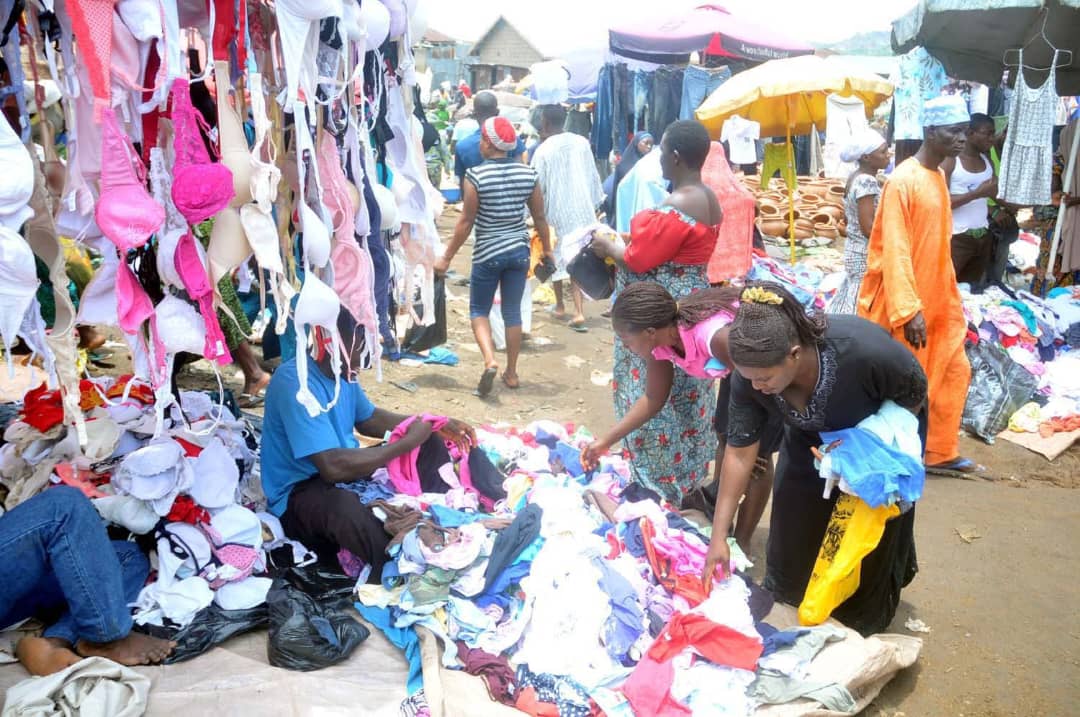A consultant dermatologist at the University of Nigeria Teaching Hospital (UNTH), Enugu, Dr. Uche Ojinmah, has raised concerns over the dangers of wearing unwashed second-hand clothes.
When interviewed, Ojinmah warned that this habit exposes people to skin infections such as dermatitis, scabies, fungal diseases and other health complications.
Moving on, he noted that bacteria and fungi could easily thrive in these clothes, especially when they remain in storage for long periods.
The dermatologist explained that preservatives used in second-hand clothes could trigger allergic reactions in some individuals.
He advised that all second-hand clothes should be washed properly before use.
“The condition of these clothes allows bacteria to develop because fabrics can easily get contaminated,” he stated.
Furthermore, he pointed out that some second-hand clothes are stored for a long time in damp environments, making them a breeding ground for harmful microorganisms.
According to health experts, wearing such clothes without proper washing could expose users to infections.
Other dermatologist emphasized that the problem is not necessarily from the original owner but from the storage and packaging process.
“Indeed, knowing fully well that some of these clothes come in through ships or flights and are then stored in warehouses.
“Some of these warehouses are cold and damp, creating the perfect conditions for bacteria and fungi to grow,” dermatologist explained.
Ojinmah further revealed that second-hand clothes are often treated with preservatives to prevent mold and insect damage.
Explaining more, he noted that these chemicals give the clothes a distinct smell, which many people do not realize could be harmful.
“Some preservatives are used to prevent fungi and bacteria from damaging the clothes, but when they come in contact with the skin, they can trigger reactions,” he warned.
He stated that individuals with sensitive skin conditions, such as atopic dermatitis, are at higher risk of developing rashes and skin irritation from these chemicals.
“As a rule of hygiene, it is not advisable to wear someone else’s clothes without washing them first,” he advised.
Ojinmah warned Nigerians against the common practice of wearing second-hand clothes immediately after purchase.
He advised that all fairly used clothes should be properly washed, dried, and ironed before being worn.
“The right thing to do is to wash, dry, and iron these clothes before use. This will help eliminate any harmful substances that may be present,” he said.
The former President of the Nigerian Medical Association (NMA) emphasized that while second-hand clothes are affordable, hygiene should not be ignored.
He urged Nigerians to be mindful of the health risks associated with wearing unwashed clothes.
A 2021 study published in the Iranian Journal of Public Health also raised similar concerns.
The study, titled Second-Hand Clothes: A New Threat for Acquiring Parasitic Infections, found that unwashed second-hand clothes could harbor bacteria, fungi, and parasites.
Researchers discovered that wearing unwashed second-hand clothes could lead to serious skin and hair infections, including scabies and lice infestations.
They advised that such clothes should be properly disinfected before use to prevent disease transmission.
The study further revealed that many people buy second-hand clothes due to economic challenges but warned that poor hygiene practices could expose them to various infections.
“The prevalence of parasites in unwashed second-hand clothes is high, and this increases the risk of spreading skin and hair diseases,” the study stated.
Ojinmah urged Nigerians to take hygiene seriously when dealing with second-hand clothes, he cautioned that no matter how neat a cloth appears, it could still contain harmful microorganisms.
“People should not assume that because a cloth looks clean, it is safe to wear. There are invisible germs that can cause serious skin reactions,” he stressed.
He advised Nigerians to always prioritize their health and adopt proper hygiene measures when using second-hand clothes.
“Second-hand clothes should be washed with soap and water, dried properly, and ironed before wearing.
“This will help kill bacteria and fungi that may be present,” he reiterated.
He further noted that taking simple precautions could prevent unnecessary health problems.
Additionally urging traders and consumers in Nigeria’s thriving second-hand clothing market to take hygiene more seriously.
“As a dermatologist, I see many cases of skin infections caused by poor hygiene. It is important that people understand the risks involved,” he said.
Also, with the rising cost of new clothes, second-hand fashion remains popular among many Nigerians.
However, health experts continue to emphasize the need for proper hygiene to avoid infections.
Ojinmah advised that while second-hand clothes are affordable and fashionable, Nigerians must ensure they are properly cleaned before wearing them.
Readers always note this: affordability should not come at the cost of your health. Always wash your clothes before you wear them







